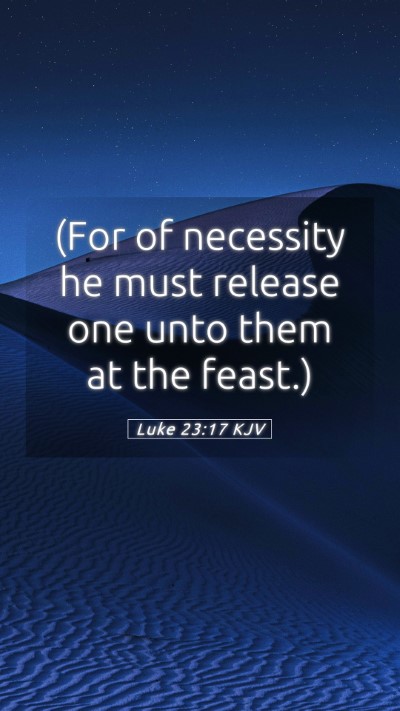Understanding Luke 23:17: A Comprehensive Bible Verse Commentary
The Bible verse Luke 23:17 states: "For of necessity he must release one unto them at the feast."
In order to grasp the meaning of this passage, we can delve into various Bible verse meanings and Bible verse interpretations provided by esteemed public domain commentators such as Matthew Henry, Albert Barnes, and Adam Clarke.
Contextual Background
Luke 23:17 is set during the trial of Jesus before Pilate, where the custom of releasing a prisoner during the Passover feast is presented. This verse highlights the necessity of fulfilling this custom, establishing a critical moment in the narrative leading to the events of the Crucifixion.
The Necessity of Release
The phrase "of necessity" indicates that this act of releasing a prisoner was not merely a suggestion, but a binding tradition that had become customary during the Passover feast. Matthew Henry explains that this tradition highlights the irony of freeing a guilty man (Barabbas) while condemning an innocent one (Jesus). The meaning of this Bible verse can be seen in the juxtaposition of righteousness versus the common practice of the people.
Matthew Henry Commentary Insights
-
Irony in Release: Henry notes the tragic choice between Barabbas, a murderer, and Jesus, the Messiah, showcasing the moral depravity of the crowd.
-
Sovereignty of God: The necessity also underscores God's sovereign plan for redemption, emphasizing that Jesus' sacrifice was preordained.
Albert Barnes Commentary Insights
-
Cultural Context: Barnes highlights that this custom was deeply rooted in Jewish tradition and reveals the political tensions of the time.
-
Jesus' Innocence: He emphasizes Jesus' innocence and the injustice of His condemnation compared to the man who was chosen for release.
Adam Clarke Commentary Insights
-
Historical Analysis: Clarke provides a historical framework, explaining the implications of the practice and how it reflects the leadership's manipulation.
-
Divine Purpose: He points out that the necessity of this event was part of a larger divine purpose, foretelling Jesus' role as the Redeemer.
Theological Implications
The release of Barabbas brings forth significant Bible verse explanations that draw attention to the nature of sin and the concept of grace. The sinner (Barabbas) is released while the sinless one (Jesus) faces execution. This passage serves as a reflection of the unmerited favor that grace represents in Christianity.
Application of Luke 23:17
Understanding this verse is essential for those desiring to engage in Bible study insights. It invites readers to consider their own choices and the nature of justice and mercy. This verse not only enhances Bible study resources but becomes a compelling topic to address in Bible study groups or online Bible study sessions.
Cross References
- Matthew 27:15 - The tradition of releasing a prisoner.
- Mark 15:6 - The fulfillment of the custom during Passover.
- John 18:39 - Pilate’s mention of this custom before the people.
Conclusion
In summary, Luke 23:17 emphasizes the societal and theological dynamics of Jesus' trial. This verse provides profound Bible study lessons about the consequences of societal choices, the intricate plan of God, and profound grace offered to humanity. Engaging in Biblical exegesis around this passage can enrich one’s spiritual journey and lead to deeper understanding Scripture in personal and communal settings.


